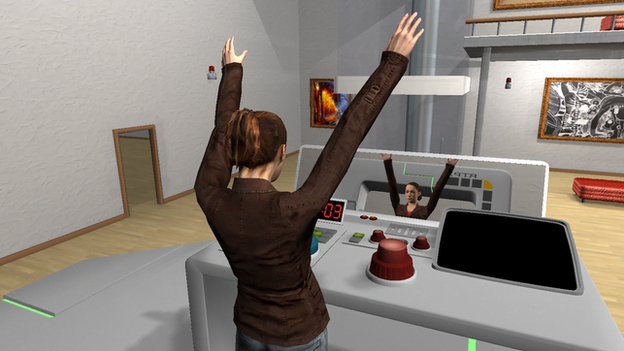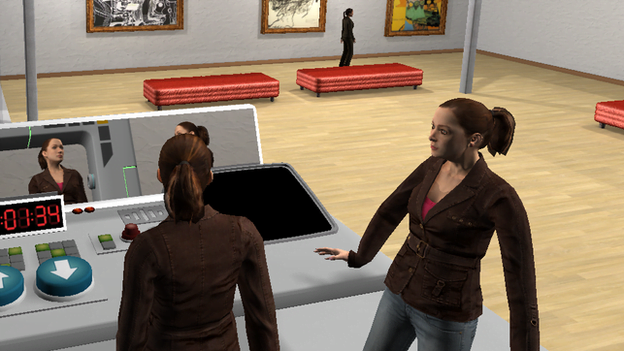Time travel has long been the fantasy of physicists and historians alike, but unfortunately, unless you are Michael J. Fox in “Back To The Future,” it will be some time before you will be able to experience it. Meanwhile, as we anxiously await the invention of a real time machine, researchers have discovered that virtual reality devices can be used to give the illusion of going “back in time.”
In an exploratory study conducted by Doron Friedman of the Interdisciplinary Center (IDC) in Herzliya, Israel, 32 subjects were unknowingly placed in a morally challenging situation in virtual reality where they were forced to make a life-or-death decision. After they had made the decision, some of the subjects were then allowed to relive the same situation, changing their actions based on past experiences. What this revealed, according to the research, is that time travel in virtual reality could be a useful tool for the treatment of post traumatic stress disorder and other forms of trauma.
Realizing the fantasy of time travel
In order to create the illusion of time travel in a world without it, the researchers used a virtual reality program where the participants could move and speak as they would in real life. Then, a morally challenging situation was created in which the study participants were presented with the choice of stopping a gunman in a crowded museum. One half of the 32 participants were allowed relive the same situation two additional times and change their decisions, while the other half (the control group) were only able to ‘live’ out the situation once.
SEE ALSO: Sleep Deprivation Reduces Risk Of Trauma
In the scenario, the participant enters into an elevator with an unknown gunman who plans to massacre five museum-goers on the second floor. The majority of the participants went up to the second floor on the first try without thinking twice, immediately regretting their decision when they discovered the gunman’s plans. However, in the second and third rounds when the participants were given the choice to intervene, many sacrificed one person on the ground floor for the lives of the five museum-goers above, mainly due to feelings of guilt.
“We found that under the conditions of repeated rounds (and not the control group), the participants that had the illusion of time travel felt less guilty about their initial decision. If we were to relate to real life, in a world without time travel, it’s a lot like going back and changing the stupid decisions you made as a kid when you are older,” Friedman tells NoCamels.
Could time travel be the future of therapy?
Sign up for our free weekly newsletter
SubscribeAfter establishing that virtual reality devices could be used to simulate time travel under certain circumstances, the research group was able to assess the psychological effects of such drastic movement in space. The central conclusion of their research was that time travel could help those suffering from PTSD or other trauma face their fears in the virtual world and move forward in the physical one.
“One of the major things that this study attempts to deal with is the widening gap between our virtual and physical worlds. Our world is becoming increasingly virtual and digital, and the skills that we acquire don’t always translate smoothly into the physical one. We wanted to create a model of causality that would reflect the physical world in the virtual world as closely as possible,” Friedman clarifies.
SEE ALSO: Science, Not Fiction: Technion And Microsoft Develop Program To Predict The Future
According to another participating researcher in the study, the virtual world was successful at imitating the physical one, to the point that the participants felt totally immersed in the past. As co-author Prof. Mel Slater of the University College of London told the BBC, “In virtual reality, the brain’s low level perceptual system does not distinguish between the virtual and the real world; the brain takes what it sees and hears in a surrounding environment as a given.”
So, while real time travel remains the dream of physicists, Friedman and his team of researchers are leaping forward into a world where therapists are a pair of immersed virtual reality (IVR) goggles that allow you to relive and maybe even change the past, for the better.
The study was conducted by Doron Friedman and Keren Or-Berkers of the Sammy Offer School of Communications at the Interdisciplinary Center Herzliya, Rodrigo Pizarro and Solene Neyret of the Universitat de Barcelona, and Mel Slater and Xueni Pan of the University College London.
Related posts

Editors’ & Readers’ Choice: 10 Favorite NoCamels Articles

Forward Facing: What Does The Future Hold For Israeli High-Tech?

Impact Innovation: Israeli Startups That Could Shape Our Future






Facebook comments